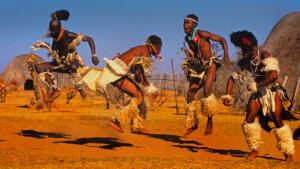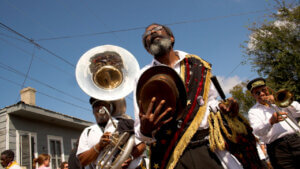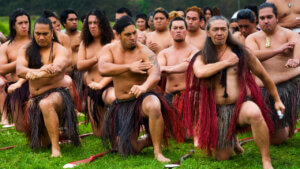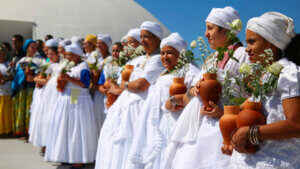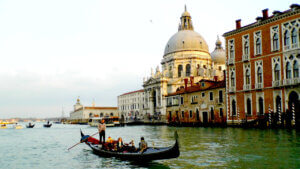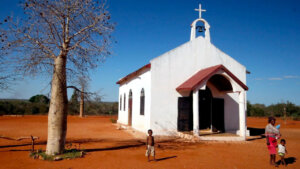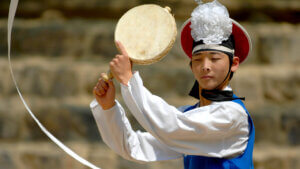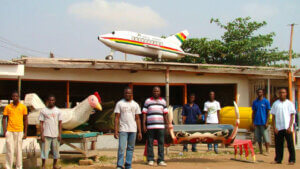Nigeria
Igbo's Second Burial
Introduction
Nigeria is a West African country with over 250 ethnic groups, all having with their own culture and language. The three largest of these groups are the Hausa–Fulani in the north, Yoruba in the west, and Igbo in the east. It is mostly Igbo customs that we are exploring in this post. The Igbo people are 98% Christian, with the rest practicing traditional religious beliefs. However, Igbo funeral rites often transcend religion since they are very much a social event too. Interestingly, there are two funerals for every deceased, making it ‘too expensive to die’ according to locals. Join us as we learn more about Igbo second burial rites!
We also discuss Hausa and Yoruba funerals, since these are the only Nigerian ethnic groups larger than the Igbo.
First Burial
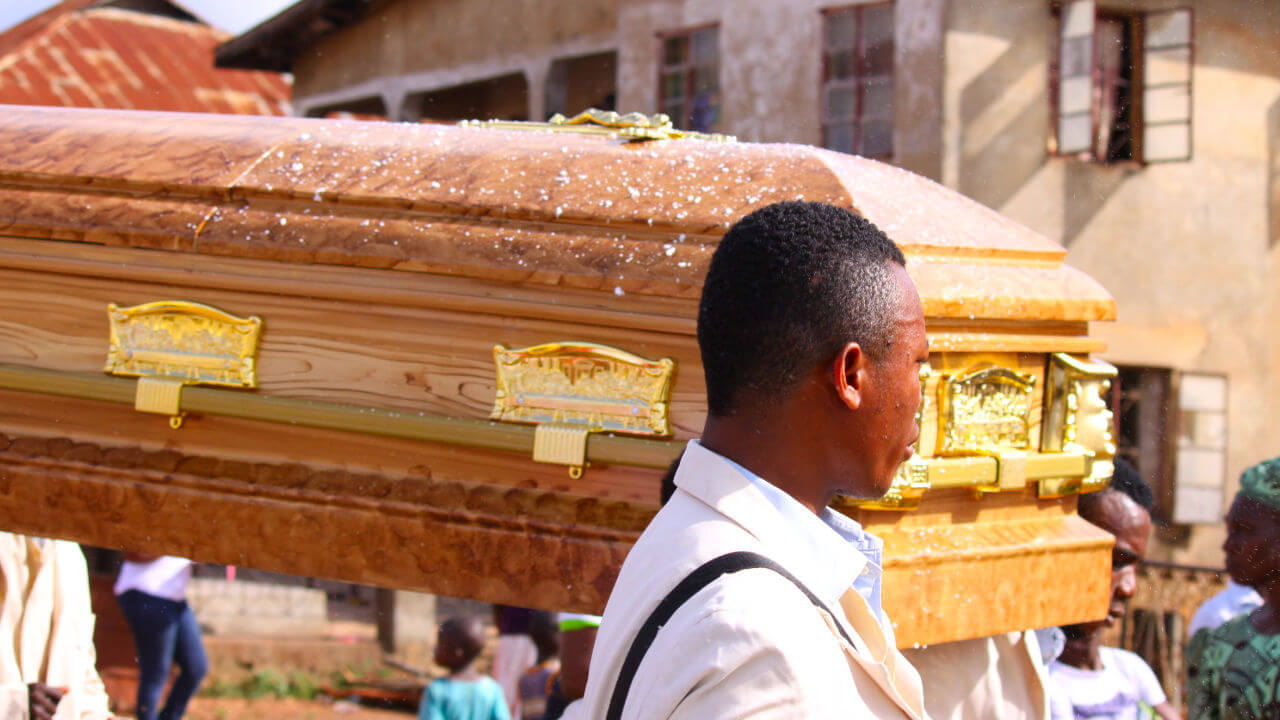
Age grades
An Igbo funeral is characterized often by huge amounts of money expended on livestock and alcohol. This depends on the age grades, or in other words, the position of the deceased within their community. Additionally, Igbo spend large amounts of money entertaining the guests and for the transportation of the corpse. Furthermore, the appropriate final resting place for an Igbo man is his ancestral village, whereas for a woman her husband’s village. Because of that, long-distance transportation of the body is quite common.
Igbo Death Practices
The body of the deceased is often scrubbed with camwood dye and placed on plantain leaves. After that, the oldest daughter of the deceased, called ada, takes part in the ino uno akwa rite. During that, she has to consume the favorite meals of the departed for a whole day. Additionally, this needs to take place in silence. By consuming the meals in silence, she ensures that her father has constant access to nutrition in the afterlife. Furthermore, the wife – or wives in case of polygamy – are wailing for their dead husband. It is also common to shave their hair completely as a sign of grief.
The family usually spends months saving money for the even more expensive ceremony of ikwa ozu, or second burial.
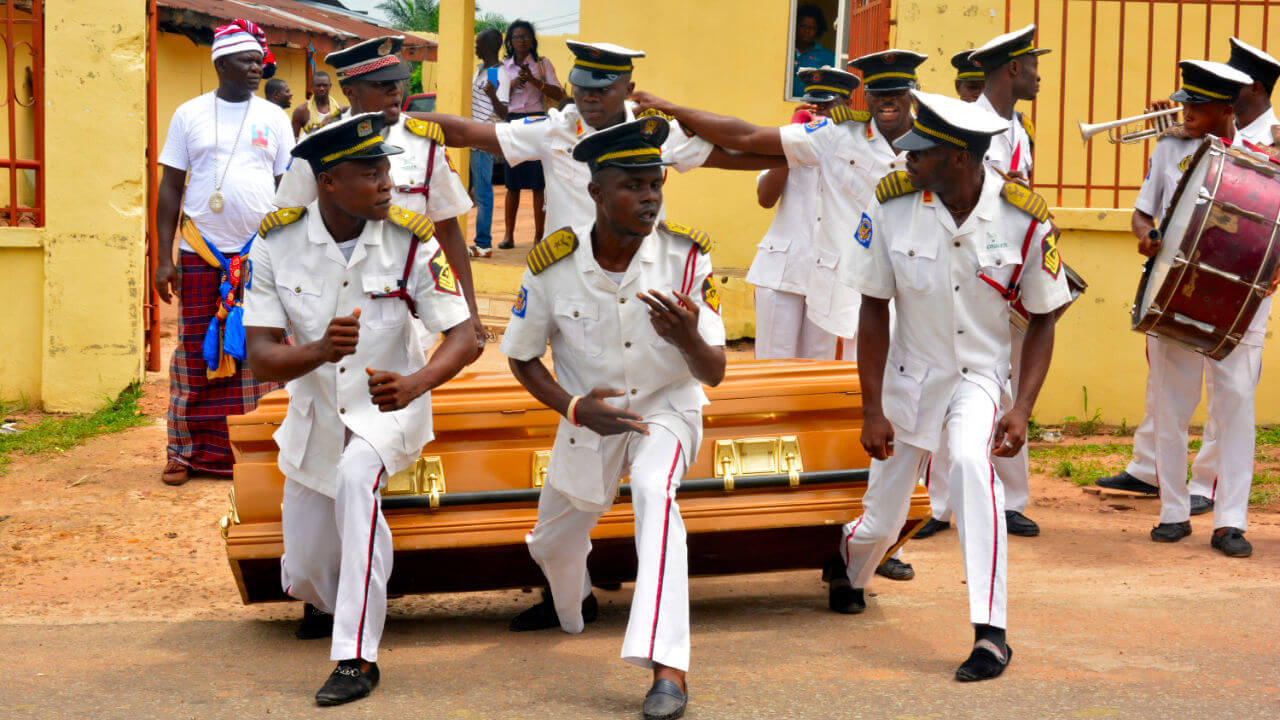
Second Burial
Ikwa ozu means ‘celebrating the dead’ and is also referred to as the second burial. This ceremony may take place anytime from weeks to a year after the first burial. According to Igbo traditions, funerals are also a rite of initiation of the dead to the group of their ancestors. Austin Echema, an Igbo priest and scholar summarizes this: “The goal of life is to become an ancestor after death”.
Mock Trials & Spirits
Additionally, Igbo customs include dances, eating and drinking, as well as the use of cows and horses. The dead person’s age grade is thus visible in all these examples. In some cases there is even a mock trial to determine who had killed the departed, even if it is no-one’s fault.
Furthermore, Mmanwu is a traditional masquerade of the Igbo. Only males perform them, and they are dressed in elaborate, colorful costumes that are meant to invoke ancestral spirits. They also participate in certain festivals and special moments for the community.
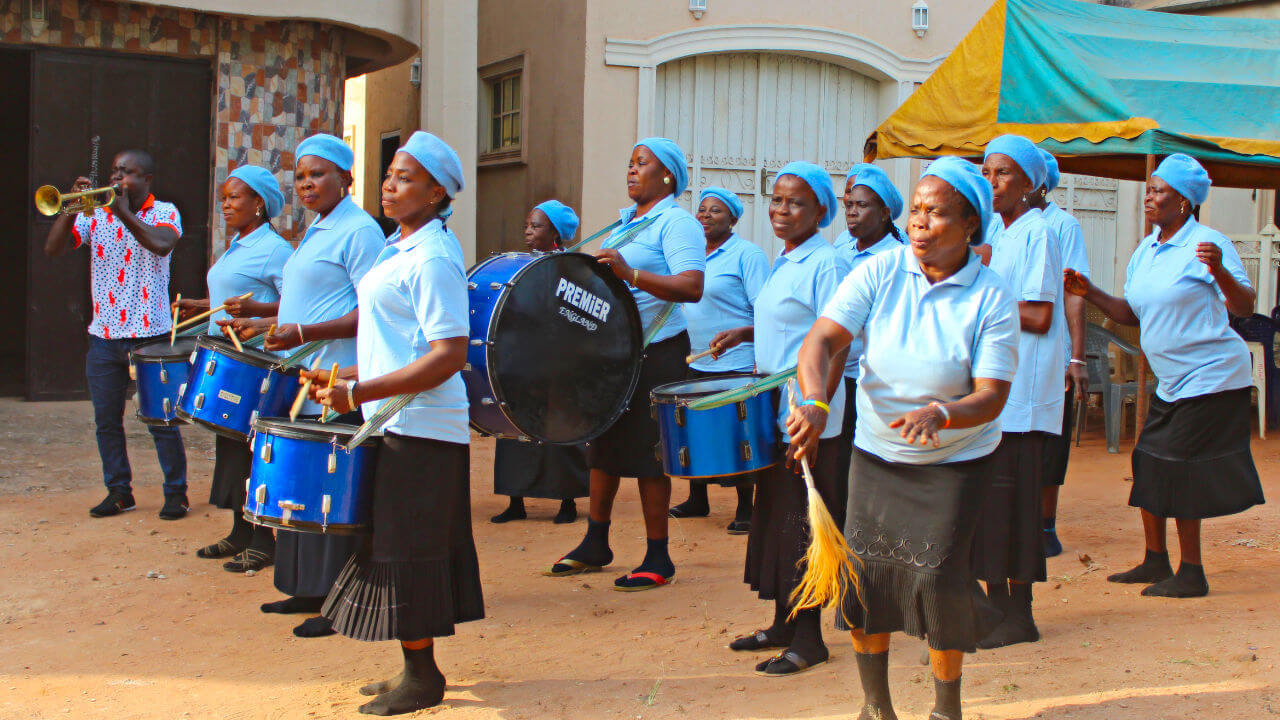
Purpose of the Ikwa ozu
The duration of the second burial depends on the role of the deceased in the community or their profession. For example, an ogbuagu, a tiger-killer, will get a Nwaubani (funeral) that lasts for seven days. However if a child dies, the funeral is much simpler, since it has not yet become a full member of the society. That same standard applies for almost anyone not yet married.
Moreover, the Igbo believe that life does not end after death, since death is simply seen as a transition to a new world. Therefore, the ceremonies Igbo perform ensure a safe passage to the spirit world. Without the rites of passage of the ikwa ozu thus, the dead will not be able to fully join their ancestors.
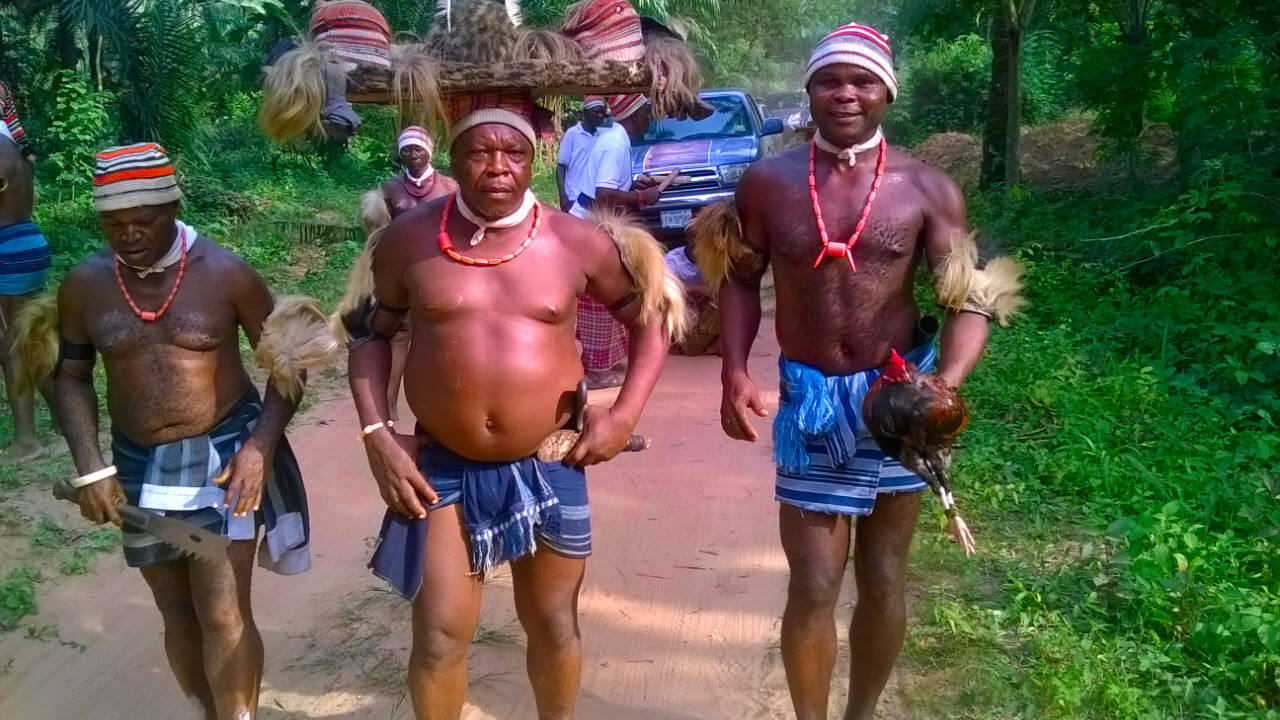
Effects for the Dead & Living
Respectability is also important: even if the deceased accumulated respect during their time alive, this does not apply to their afterlife status. An example of that is the funeral of Chinua Achebe, a famous Nigerian author. Despite his accomplishments when he was alive, he would not receive respect in the afterlife if the rites of ikwa ozu had not been performed.
Finally, it is a common belief that if a family does not organize an ikwa ozu they will be tormented by spirits. Additionally, they are also banned from obtaining any titles or key positions in their community.
Therefore, the ikwa ozu seems to benefit both the dead and the living!
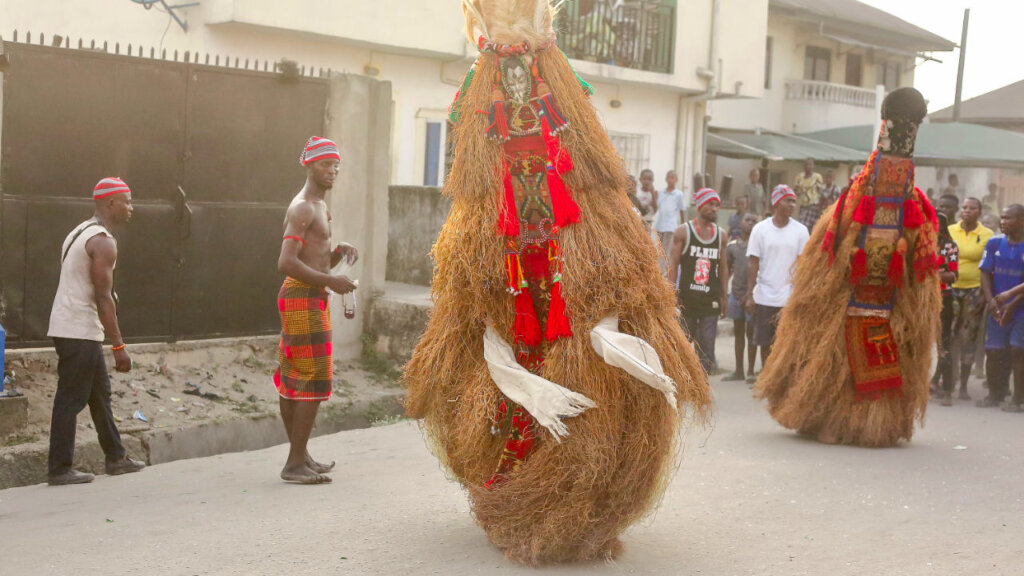
Ikwa ozu & Christianity
As mentioned above most of modern-day Igbo are mostly Christians. Christian Churches are influencing how both first and second modern burials take place. Firstly, they have placed a limit on how long relatives can keep their loved ones in the mortuary. This usually lasts up to two to three weeks. If the limit is not respected, they may refuse to officiate a burial ceremony.
Secondly, the ikwa ozu is frowned upon since it is seen as pagan. However, due to the social nature of the ceremony, often even the most pious Christians are hesitantly taking part in the celebrations. This social pressure becomes even more apparent if considering that families that not performing the ikwa ozu may not have certain roles in their community.
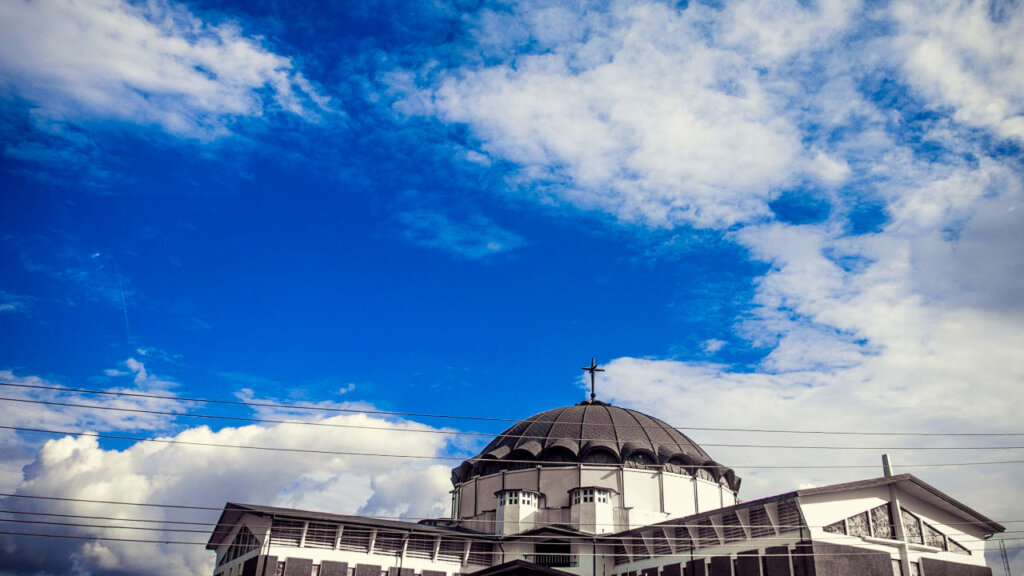
Navigating Belief Systems
Church-goers, though, find ways of intermixing Christian and Indigenous Igbo death customs, in an attempt to bridge religious and social discrepancies. For instance, during the shaving of widows’ heads, the rest of the women may start chanting Christian rites and songs. Additionally, instead of being completely silent during the meals of the ino uno akwa, the ada prays by reading the Bible. Finally, another effort to bridge the two belief systems is that the second burial is then called a memorial service.
These death practices are examples of reconciliation between two belief systems. They also underline how the Igbo manage to combine tribal and Christian culture and social norms, in the face of death.
Hausa & Yoruba Funeral Customs
It is interesting to also briefly discuss the funeral practices of the other two large ethnic groups in Nigeria: the Hausa and the Yoruba.
Hausa’s Islamic Rites
Most of the Hausa-Fulani tribes are Muslim and reside in the Northern part of Nigeria. They came in touch with Islam through the Saharan trading routes and consist over one third of Nigeria’s population.
The Hausa usually follow Muslim funeral rites. For example, cremation is forbidden both according to Islamic teaching and tribal traditions. Therefore, the vast majority of Hausa practice burials. Embalming the corpse is similarly not common among Muslim Nigerians. Instead they wash it and wrap it in a burial veil.
After death, the corpse is placed in position facing Mecca, a common practice among Muslims. Autopsies are also frowned upon since the dead should not be disturbed. Finally, the typical mourning period for a spouse is around three months.
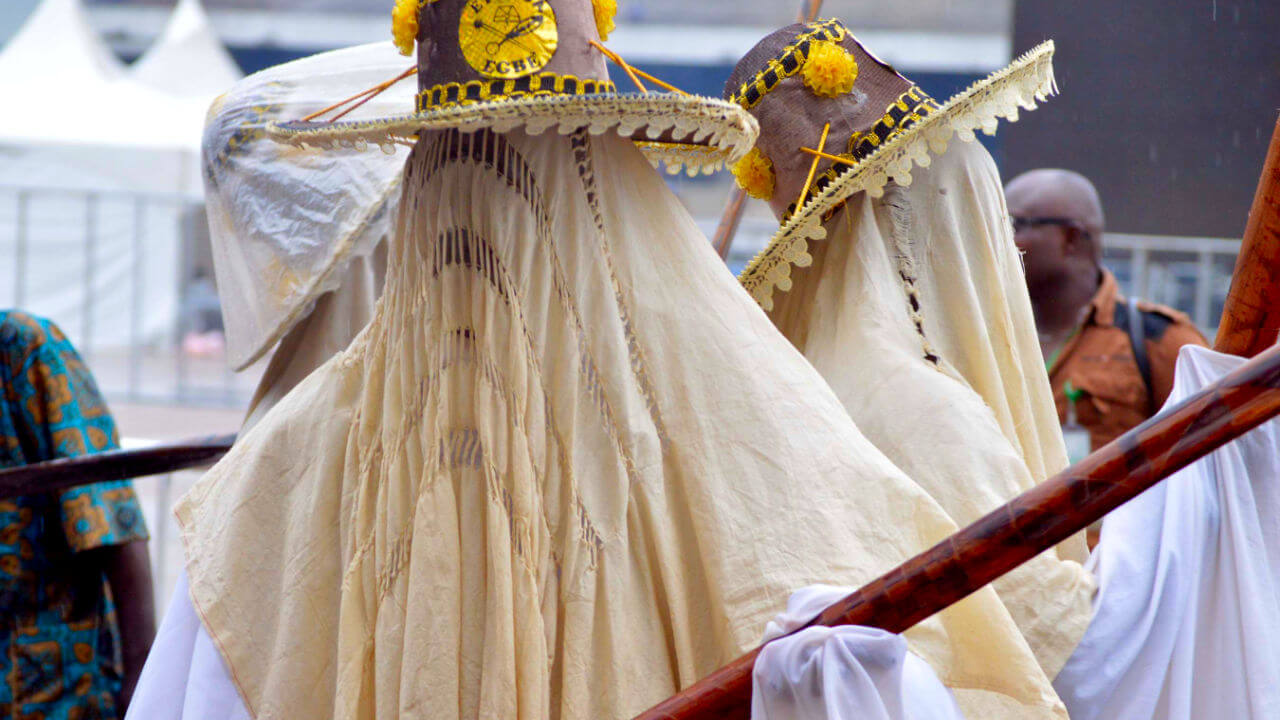
Yoruba’s Ìsínku
The Yoruba faith evolves around the Orishas, spirits that define the world. There are many Yoruba schools of thought but they all agree that there are at least 400 orishas.
The three pillars of Yoruba prayers are wealth, children and immortality. It is, thus, only the ignorant that really are afraid of death. Their fear is based on the unknown character of the afterlife. A faithful Yoruba though knows that life continues after death. According to the Yoruba religion, people continue existing in the afterlife, quite similarly even to how they lived before.
Good death
Therefore, immortality is crucial for the Yoruba faith. Ancestors also play a crucial role since they may influence one’s life. Because of all these, having a good death is important. A good death is a Yoruba notion that relates to having a proper funeral (“Ìsínku”). Moreover, during a Yoruba funeral relatives celebrate the life of the deceased. A good death also includes leaving a good name to your children, meaning a respectful, honorable position in their community. After all, the Yoruba are aware of the realistic possibility of dying young. Because of that, everyone needs to actively try to leave a good legacy.

Finally, death for the Yoruba does not prevent the love between close relatives. They specifically believe that the loving bond between parents and children remains strong even when one of them exists in the afterlife. Finally, relatives often hire expensive bands of drummers as a way of paying respect to the dead.
"I have become an aged ose tree. I will no longer die. I have become two hundred hills rolled into one. I am immovable"
- Yoruba saying
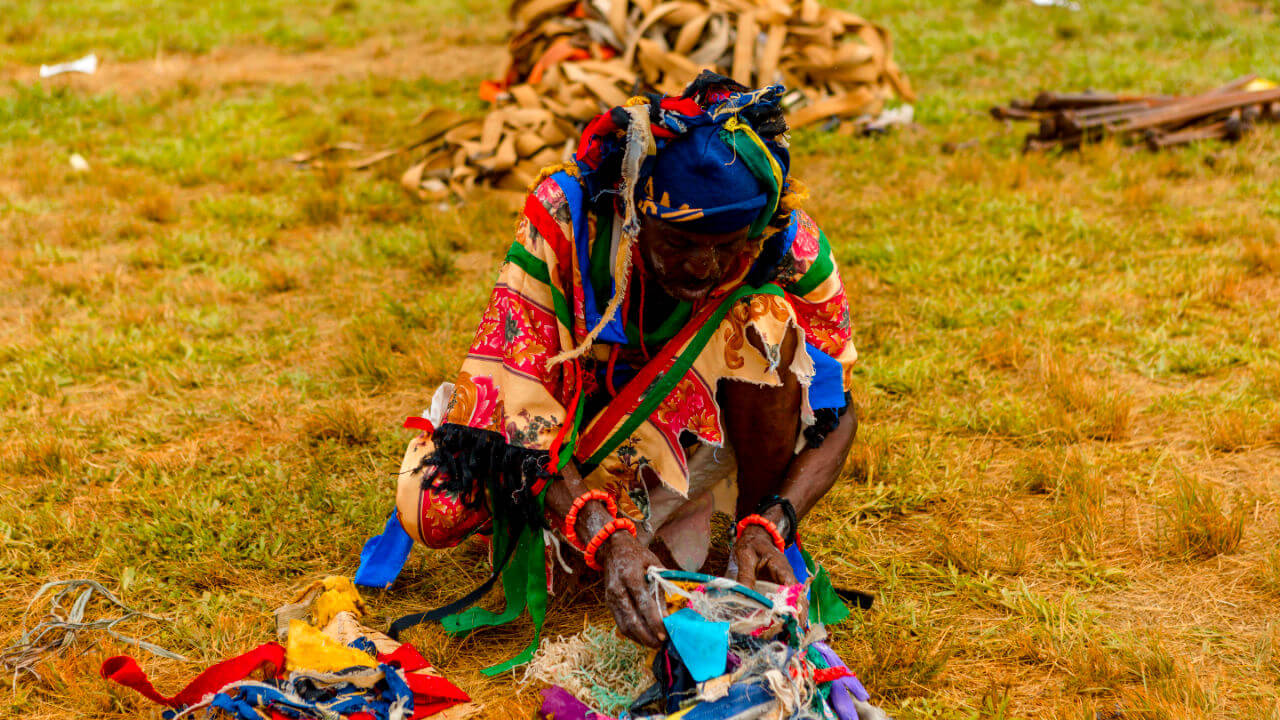
Read more
We hope you learned something new about this country’s death practices!
You can also read more on funeral practices with Yoruba roots with our articles on Brazil and Cuba. Additionally, for more on West African death customs, we recommend our Ghana article. Finally, another example of a second burial could the Famadihana in Madagascar.
Stats & Facts
The average mixed death rate in Nigeria is 11,86 per 1.000 people (2018).
The time of the funeral depends heavily on the religious and ethnic background of the deceased. The Muslim Hausa, for example, bury their dead as soon as possible after death. Christian Nigerians may take their time instead. For instance the Igbo usually prepare a very elaborate funeral.
Around 54% of Nigerians are Muslim, with different forms Christianity coming second. Most Nigerian Muslims are either Sunni or non-denominational. Although Islam has more followers, Nigeria still has the largest number of Christians than any other African country.
No clear data regarding Nigeria’s donor system is currently available. A research in Lagos found that 60% of the participants knew of organ transplantation, and 30% was willing to donate.
Life expectancy
- Akwamozu, the traditional funeral rite performed in Igbo land – Obindigbo (2015)
- Crude Death Rate / Nigeria – World Bank
- Cultural Spotlight: Nigerian Funeral Traditions – Jenny Goldade (2018)
- Don’t be in the dark, this is how some Africans send off the dead – Farida Dawkins (2018)
- Hausa Funeral
- Igbo burials: How Nigeria will bid farewell to Achebe – Adaobi Tricia Nwaubani (2013)
- Igbo Funeral Rituals – Aislinn Widmeier (2014)
- Ikwa mmadu – Rev. Fr. Eva Chuma Nnamene
- Mourning and Celebration of Life in the Burial Rites of Igbo Culture – Kimberly Lane (2015)
- Nigerian Catholic funerals an initiation to community of ancestors – Thomas M. Landy (2020)
- Nigerian Funerals: Customs, Ceremony & What to Expect – Klaudia Krystyna (2021)
- Nigeria – Religion
- Odusanya, O. O., & Ladipo, C. O. (2006). Organ donation: knowledge, attitudes, and practice in Lagos, Nigeria. Artificial organs, 30(8), 626–629. https://doi.org/10.1111/j.1525-1594.2006.00272.x
- Religion in Nigeria
- Yoruba Culture – Funeral (Ìsínku)
- Philipsakwari, CC BY-SA 4.0, via Wikimedia Commons
- Macnueldemi, CC BY-SA 4.0, via Wikimedia Commons
- Gogeafrica, CC BY-SA 4.0, via Wikimedia Commons
- oboro oizamisi, CC BY 4.0, via Wikimedia Commons
- Philipsakwari, CC BY-SA 4.0, via Wikimedia Commons
- Arch-Angel Raphael the Artist, CC BY-SA 4.0, via Wikimedia Commons
- Kenneth Izuogu, CC BY-SA 4.0, via Wikimedia Commons
- Nsofor1, CC BY-SA 4.0, via Wikimedia Commons
- Kelechukwuajoku, CC BY-SA 4.0, via Wikimedia Commons
- deveshubaNg, CC BY-SA 4.0, via Wikimedia Commons
- Omoeko Media, CC BY-SA 4.0, via Wikimedia Commons
- S.aderogba, CC BY-SA 4.0, via Wikimedia Commons
- Solasly, CC BY-SA 4.0, via Wikimedia Commons
- Philipsakwari, CC BY-SA 4.0, via Wikimedia Commons
- Nsofor1, CC BY-SA 4.0, via Wikimedia Commons

